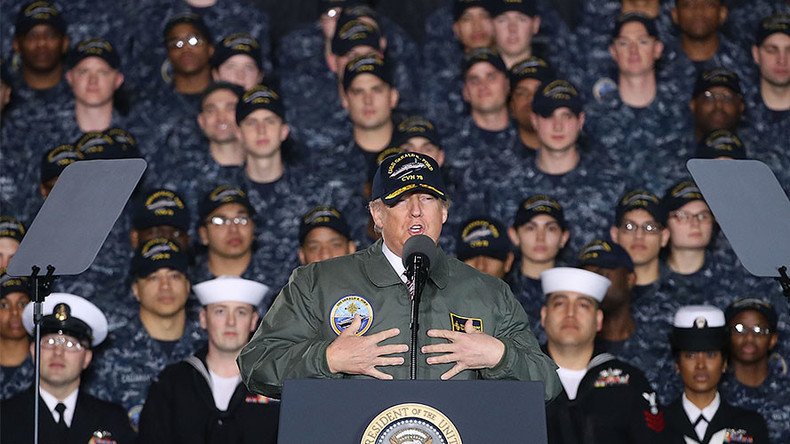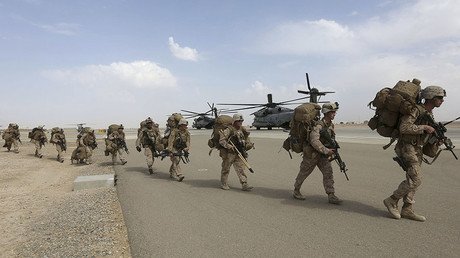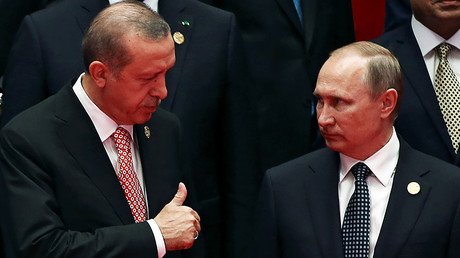Trump dons 'full-metal-jacket' in embrace of war economy

Whatever happened to America First? Building roads and infrastructure and looking after the “forgotten American workers”? In his first national budget outlined this week, President Trump is going 'full-metal-jacket' with militarism.
Donald Trump campaigned on a ticket deploring reckless US overseas wars. He vowed to make “America great again” by focusing his supposed business talents on building the US economy at home.
But, disturbingly, this president seems more militarist than any predecessor.
His budget plan unveiled this week proposes spending an extra $54 billion (10 percent increase) on America’s already gargantuan annual military budget of $600 billion – more than half of the government’s total discretionary spend.
That means more nuclear weapons, warplanes, warships, tanks, and troops. Inevitably, it means more US wars abroad.
A shift: Trump’s budget requests $54 bn defense increase, while slashing other departments https://t.co/2wd2eo7El9
— RT (@RT_com) March 16, 2017
White House officials relished in calling the federal financial plans a “hard power budget.”
At the same time, draconian cuts are lined up for multiple social programs that will gut living conditions for millions of poor Americans – the very constituency that helped Trump win the presidency, based on a vague hope that he would help them.
In addition to slashing social welfare, Trump’s budget will eradicate programs dedicated to public broadcasting, legal services for low-income citizens, museums and libraries, arts and humanities, and medical and science research, to name but a few.
In other words, Trump is ramping up America as a war economy, an economy that will serve foreign wars and a class war at home. The very people who formed the electoral base for Trump’s victory to the White House are being betrayed.
Trump’s “embrace of the military,” as the Washington Post described it, is already being manifest in foreign policy.
This week, his Secretary of State Rex Tillerson raised the stakes over tensions in the Asia-Pacific region by declaring the US was prepared to carry out pre-emptive military strikes on North Korea. Tillerson was speaking while visiting American allies Japan and South Korea, who are unnerved by recent missile tests conducted by North Korea. He added forebodingly that Washington’s “strategic patience had run out” over the communist state and its nuclear weapons program.
As the Washington DC-based Council on Foreign Relations noted, no previous US administration has made such an explicit threat to North Korea.
Meanwhile, in the same week, the Trump administration was weighing Pentagon plans to send an additional 1,000 troops into Syria. The move follows reports earlier this month that up to 2,500 American soldiers had been sent to Kuwait for deployment in Syria and Iraq.
This is a marked escalation of US military involvement in Syria compared with the Obama administration. Yet, ironically, it was Trump as a presidential candidate who deplored the “disaster” of foreign wars created by Obama and his former Secretary of State Hillary Clinton.
The general background to Trump’s headlong embrace of militarism is the systemic nature of American capitalism as a war-driven economy. American capitalism could not survive were it not for the massive government subsidizing of the Pentagon and the corporations of the military-industrial complex. Even a supposed free-wheeling entrepreneur like Donald Trump cannot escape that reality.
But there are also specific factors as to why the Trump administration is donning the full-metal-jacket and moving toward more military intervention in Syria and the Middle East.
Firstly, Trump is no doubt trying to keep the war-prone Deep State sweet by plying money into the military budget. As several commentators have noted, the Deep State of US intelligence and Pentagon are inclined to a “soft coup” against Trump by forcing him out with impeachment over his alleged Russian ties. Trump seems to be trying to placate the hounds within the Deep State by throwing more pork-barrel their way – $54 billion to be precise.
Reports this week of Trump giving the CIA a renewed license to carry out drone assassinations tend to also fit this calculus of pandering.
Secondly, it seems significant that the more militaristic turn in Syria and the Middle East under Trump comes at a time when Russia has gained immense kudos across the region for its principled intervention against terrorism. There has even been talk of Russia displacing the US as the primary player in the strategic region.
Various neocon-connected think tanks in Washington have recently called for US policy to push back on the influence gained by Russia and its ally Iran in the Middle East.
Another important factor is how traditional US ally and key NATO member Turkey has realigned with Russia. Last week, Turkish President Recep Tayyip Erdogan was greeted in Moscow by Vladimir Putin. Both leaders reaffirmed commitments to solving the Syrian conflict, as well as furthering major commercial deals for the South Stream gas project into Europe, as well as the purchase by Turkey of Russia’s S-400 air defense system.
The planned dispatch of 1,000 more US troops to Syria reportedly to lend support to Kurdish fighters for the forthcoming offensive on Raqqa against so-called Islamic State (Daesh) militants is bound to rile Turkish anger. Erdogan has repeatedly warned against American support for the Kurds, whom Ankara sees as terrorists in league with the Turkish Kurds of the outlawed PKK.
Several other factors this week indicate a newfound militarism under Trump. The US president hosted Saudi defense minister, Deputy Crown Prince Mohammed Bin Salman, in the Oval Office. The Saudi delegation hailed the meeting a “historic turning point” signifying what took place was more than just a perfunctory photo-op. Trump has also recently lifted Obama-era restrictions on arms sales to the Saudis, who have stepped up their bombardment and blockade of Yemen.
This week too saw the Syrian armed opposition suddenly withdraw from the third round of peace talks organized by Russia and Turkey in Astana. Then, the Syrian capital Damascus was rocked by a series of deadly bomb attacks with over 30 killed. UN Syrian envoy Staffan de Mistura said the attacks were clearly aimed at destroying the peace talks overseen by Russia in Astana.
Finally, it seems significant that US and Israeli warplanes reportedly carried out air strikes across Syria within days of each other. Syrian defense forces claim to have shot down one of four Israeli planes, while reports say US air strikes in Aleppo province killed over 40 civilians when a mosque in the village of Al Jina was targeted. The Pentagon denied responsibility for the attack on the mosque, but media images showed American ordnance was used.
MORE: CENTCOM admits hitting ‘Al-Qaeda meeting’ in Idlib amid reports of deadly #Aleppo mosque strike few miles away https://t.co/gRmCyqqWxWpic.twitter.com/LYt7NCP4tu
— RT (@RT_com) March 17, 2017
All in all, Trump is spending more money on the American military (a budget already 10-fold greater than Russia’s), is slashing money for America’s elderly, sick and poor (who voted for him), and the corollary is manifestly more militarism around the world, including the tinderbox Asia-Pacific and the Middle East.
Let’s face it. America is a warmongering rogue state. It is incorrigibly so. Even a president who proclaimed a bright new beginning for forgotten American workers and downtrodden communities by repudiating reckless overseas wars – ends up being a bigger militarist than ever.
The United States under prevailing conditions is a lost cause for democracy, civility, and peace.
The statements, views and opinions expressed in this column are solely those of the author and do not necessarily represent those of RT.















